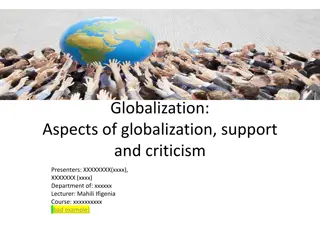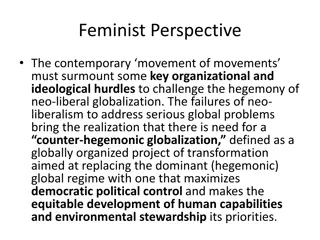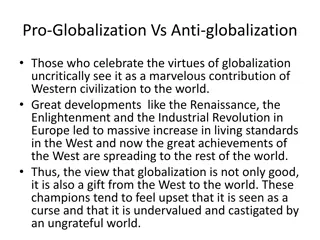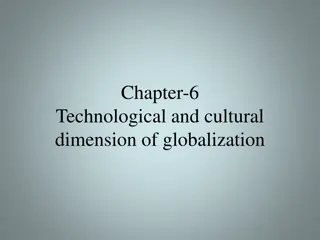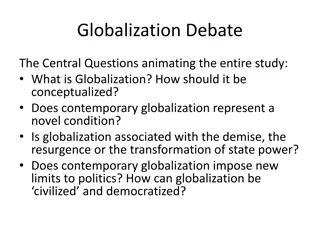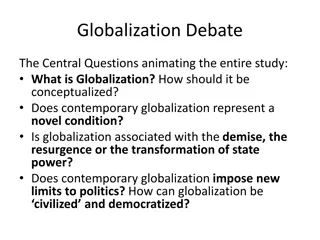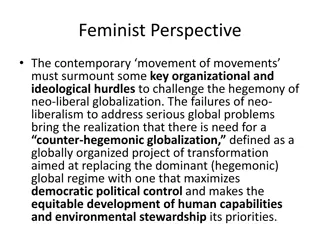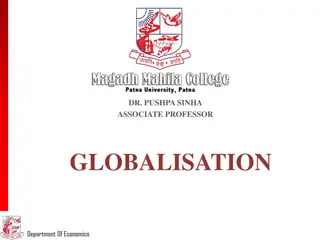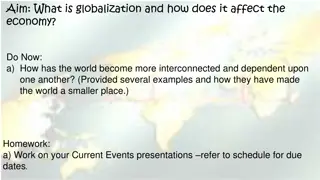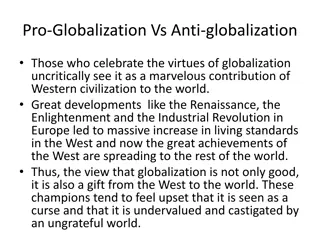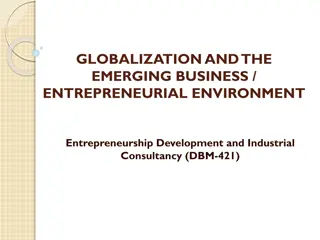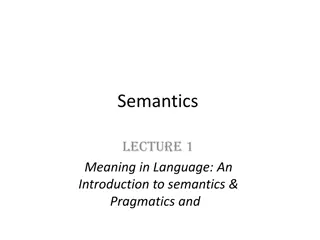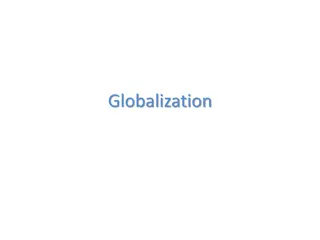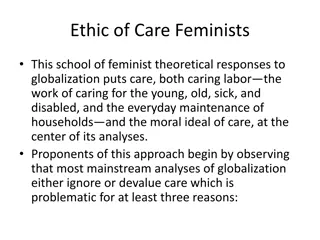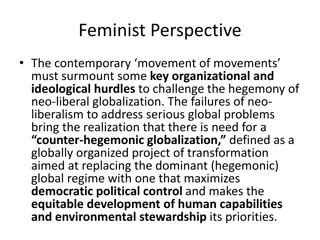Understanding Globalization: Meaning and Concepts Explored
Explore the meaning and concept of globalization, a term used to describe the interdependence of countries in trade, finance, culture, and more on a global scale. Discover how globalization connects nations and shapes our world today.
Uploaded on Jul 22, 2024 | 0 Views
Download Presentation

Please find below an Image/Link to download the presentation.
The content on the website is provided AS IS for your information and personal use only. It may not be sold, licensed, or shared on other websites without obtaining consent from the author. Download presentation by click this link. If you encounter any issues during the download, it is possible that the publisher has removed the file from their server.
E N D
Presentation Transcript
Globalization Meaning and Concept BY DR PRAMOD KUMAR
Meaning and Concept of Globalization Globalization is actually the idea that there will be no national boundary in the world of business and commerce and all the trade will operate on an international scale. Globalization is a word which everyone today uses very normally and associates it with any and every thing, but the vastness of the word is not the way it appears to us normally. Recognizing the cultural diversity of the world to build a harmonious world is another agenda of Globalization.
Meaning and Concept of Globalization The Oxford English Dictionary (OED) says globalisation is the act of globalising ; from the noun global meaning pertaining to or involving the whole world . Globalization is a broad term and encompasses varied perspectives. It refers to the global outlook of different nations of the world coming closer and joining hands in terms of economy, education, society and politics. Globalization empowers a view for the entire world as a whole irrespective of the national identity and thus globalization has narrowed the world by bringing people of all nations closer.
Meaning and Concept of Globalization Globalization interdependence of countries resulting from the increasing integration of trade, finance, people, and ideas in one global marketplace. refers to the growing Globalization is the system of interaction among the countries of the world in order to develop the global economy. Globalization refers to the integration of economics and societies all over the world. involves political, and cultural exchanges made possible largely by advances transportation, and infrastructure. Globalization technological, economic, in communication,
Meaning and Concept of Globalization The term globalization comes from English, as base of the word globalization which refers to the emerging of an international network, economical and social system. One of the earliest uses of the term globalization , as known, was in 1930 - in a publication entitled Towards New Education - to designate an overview of the human experience in education . Since 1960 both terms interchangeably by economists and researchers in social sciences. The term Globalization has been used in 1980s, when computer technology first began making it easier and faster to conduct business internationally. belonging to an began to be used
Meaning and Concept of Globalization Vladislav Inosemtsev defines globalization as one of the most popular social studies of today, but is at the same time an empty term. It was first mentioned in literature in the mid 1940s, but up until the mid 1980s it was mentioned only occasionally. After the Cold War the term began to be used to describe the world becoming more interdependent in its economical and informational dimension.
Meaning and Concept of Globalization Roland Robertson, a professor of sociology at the University of Aberden, was the first person who defined globalization as the understanding of the world and the increased perception of the world as a whole . Martin define globalization as all those processes by which the peoples of the world are incorporated into a single world society . Albrow and Elizabeth King, sociologists,
Meaning and Concept of Globalization Anthony Giddens uses the following definition: the globalization can be defined as the intensification of social relations throughout the world, linking distant localities in such happenings are formed as a result of events that occur many miles away and vice versa . a way that local David defines globalization as, although in a simplistic sense globalization refers to a rapid global interconnection, deep and on large scale, such definition but requires research . now a more complex
Meaning and Concept of Globalization The Swedish journalist Thomas Larsson, in his book The Race to the Top: Globalization , says that globalization is the process of the shrinking of the world, the shortening of distances, and the closeness of things . The Real Story of Majid Tehranian defines globalization as a process that began more than 5000 years ago but was significantly accelerated after the fall of the Soviet Union, in 1991. The elements of globalization include capital, labor, management, news, images, all transporter information.
Meaning and Concept of Globalization George Modelski has an interactive conception of globalization, and sees globalization as a process with four dimensions: the economic globalization, the forming of world opinion, the democratization and the political globalization. Any change in one of these four dimensions determines changes in the other dimensions. Christopher Chase-Dunn brings, since the late 80s, a new term that enters globalization. Instead development problems, the term seemed rather to cause confusion and misunderstandings. the popular clarifying discourse: the of world
Meaning and Concept of Globalization There are at least five different dimensions of the globalization that need to be distinguished: the economic globalization, the political globalization, the common ecological constraints, the cultural institutions and values and the globalization of the communication. Jeffrey Hart identified five concepts globalization: represented by the 1. The existence of a global infrastructure, 2. The global harmonization or convergence of important characteristic 3. The lack of borders 4. The global Diffusion of initially localized phenomena and 5. The geographic dispersion of core skills in the highest and most desirable activities. These concepts form a whole in which human society develops.
Meaning and Concept of Globalization According to Modelski (2007), "globalization is a process along four dimensions: economic globalization, world opinion formation, democratization, and political globalization".
Meaning and Concept of Globalization In 2000 the International Monetary Fund has identified four basic aspects of globalization: trade and transactions, capital investment, migration and movement of people and the spreading of knowledge. movements and The World Bank defines Globalization - the growing integration of economies and societies around the world.
Meaning and Concept of Globalization World Pascal Lamy defines Globalization can be defined as a historical stage of accelerated expansion of market capitalism, like the one experienced in the 19th century with the industrial revolution. It is a fundamental transformation in societies because of the recent technological revolution recombining of the economic and social forces on a new territorial dimension. The globalization involves spreading of ideas, practices and technologies, and internationalization and universalization. It is not simply the modernization or westernization. Certainly it is much more than market liberalization. Trade Organization (WTO) Director-General, which has led to a it is little more than
Meaning and Concept of Globalization According globalization has become a favorite catchphrase of everyone; journalists, environmentalists, lawyers, and even farmers. to Oji & Ozoiko (2011) nowadays economists, politicians,
The Rise and Origin of Globalization Globalization has a long history; it appeared when the European big economic powers occupied Asia, Africa, and America. It began in the late nineteenth century, but its spread slowed during the period from the start of the First World War until the third quarter of the twentieth century. In recent years the term of globalization has been used enormously by however, it is not a totally new phenomenon. media and academics
The Rise and Origin of Globalization Globalization century but it became recognized as a research phenomenon about three decades ago, at the time its political and economic associations began to be studied. was developed in the twentieth Globalization accelerated in the nineteenth century during the industrial revolution. As the factories became established, more companies used lands for their production and investment, replacing and selling goods with each other.
The Rise and Origin of Globalization When Great Britain colonized India, Great Britain used India for its policy and purpose, for instance, most cotton for British traders was made in the city of Madras, the big and important port in India. In time, the madras cloth was no longer exclusively produced in Madras, instead, all the Indian labor force supplied cotton (national-geographic)
Globalization and India Developed countries have been trying to pursue developing countries to liberalize the trade and allow more flexibility in business policies to provide equal opportunities to multinational firms in their domestic market. International Bank helped them in this endeavour. Monetary Fund (IMF) and World Liberalization began to hold its foot on barren lands of developing countries like India by means of reduction in excise duties on electronic goods in a fixed time frame.
Globalization and India Indian government did the same and liberalized the trade and investment due to the pressure from World Trade Organization. Import duties were cut down phase-wise to allow MNC s operate in India on equality basis. As a result globalization has technologies, new products opportunities. Despite bureaucracy, lack of infrastructure, and an ambiguous policy framework that adversely impact MNCs operating in India, MNCs are looking at India in a big way, and are making huge investments to set up R&D centers in the country. India has made a lead over other growing economies for IT, business processing, and R&D investments. There have been both positive and negative impacts of globalization on social and cultural values in India. brought and to the India economic new also
Impacts of Globalisation in India Economic Impact: Greater Number of Jobs: The advent of foreign companies and growth in economy has led to job creation. However, these jobs are concentrated more in the services sector and this has led to rapid growth of service sector creating problems for individuals with low level of education. The last decade came to be known for its jobless growth as job creation was not proportionate to the level of economic growth. More choice to consumers: Globalisation has led to a boom in consumer products market. We have a range of choice in selecting goods unlike the times where there were just a couple of manufacturers. Higher Disposable Incomes: People in cities working in high paying jobs have greater income to spend on lifestyle goods. There has been an increase in the demand of products like meat, egg, pulses, organic food as a result. It has also led to protein inflation.
Impacts of Globalisation in India Protein food inflation contributes a large part to the food inflation in India. It is evident from the rising prices of pulses and animal proteins in the form of eggs, milk and meat. With an improvement in standard of living and rising income level, the food habits of people change. People tend toward taking more protein intensive foods. This shift in dietary pattern, along with rising population results in an overwhelming demand for protein rich food, which the supply side could not meet. Thus resulting in a demand supply mismatch thereby, causing inflation. In India, the Green Revolution and other technological advancements have primarily focused on enhancing cereals productivity and pulses and oilseeds have traditionally been neglected.
Impacts of Globalisation in India Shrinking Agricultural Sector: Agriculture now contributes only about 15% to GDP. The international norms imposed by WTO and other multilateral organizations have reduced government support to agriculture. Greater integration of global commodities markets leads to constant fluctuation in prices. This has increased the vulnerability of Indian farmers. Farmers are also increasingly dependent on seeds and fertilizers sold by the MNCs. Globalization does not have any positive impact on agriculture. On the contrary, it has few detrimental effects as government is always willing to import food grains, sugar etc. Whenever there is a price increase of these commodities. Government never thinks to pay more to farmers so that they produce more food grains but resorts to imports. On the other hand, subsidies are declining so cost of production is increasing. Even farms producing fertilizers have to suffer due to imports. There are also threats like introduction of GM crops, herbicide resistant crops etc.
Impacts of Globalisation in India Increasing Health-Care costs: Greater interconnections of the world has also led to the increasing susceptibility to diseases. Whether it is the bird-flu virus or Ebola, the diseases have taken a global turn, spreading far and wide. This results in greater investment in healthcare system to fight such diseases. Child Labour: Despite prohibition of child labor by the Indian constitution, over 60 to a 115 million children in India work. While most agricultural laborers, urban manufacturing, processing, Globalization most directly 300,000 Indian children who work in India s hand- knotted carpet industry, which exports over $300 million worth of goods a year. rural child children servicing exploits workers work and an estimated are in repairs.
Impacts of Globalisation in India Socio-Cultural Impact on Indian Society Nuclear families are emerging. Divorce rates are rising day by day. Men and women are gaining equal right to education, to earn, and to speak. Hi , Hello is used to greet people in spite of Namaskar and Namaste. American festivals like Valentines day, Friendship day etc. are spreading across India. Access to education: On one hand globalisation has aided in the explosion of information on the web that has helped in greater awareness among people. It has also led to greater need for specialisation and promotion of higher education in the country. On the flip side the advent of private education, coaching classes and paid study material has created a gap between the haves and have-nots. It has become increasingly difficult for an individual to obtain higher education.
Impacts of Globalisation in India Growth of cities: It has been estimated that by 2050 more than 50% of India s population will live in cities. The boom of services sector and city centric job creation has led to increasing rural to urban migration. Indian cuisine: is one of the most popular cuisines across the globe. Historically, Indian spices and herbs were one of the most sought after trade commodities. Pizzas, burgers, Chinese foods and other Western foods have become quite popular. Clothing: Traditional Indian clothes for women are the saris, suits, etc. and for men, traditional clothes are the dhoti, kurta. Hindu married women also adorned the red bindi and sindhur, but now, it is no more a compulsion. Rather, Indo-western clothing, the fusion of Western and Sub continental fashion is in trend. Wearing jeans, t-shirts, mini skirts have become common among Indian girls.
Impacts of Globalisation in India Indian Performing Arts: The music of India includes multiples varieties of religious, folk, popular, pop, and classical music. India s classical music includes two distinct styles: Carnatic and Hindustani music. It remains instrumental to the religious inspiration, cultural expression and pure entertainment. Indian dance too has diverse folk and classical forms. Bharatanatyam, Kathak, Kathakali, Mohiniattam, Kuchipudi, Odissi are popular dance forms in India. Kalarippayattu or Kalari for short is considered one of the world s oldest martial art. There have been many great practitioners of Indian Martial Arts including Bodhidharma who supposedly brought Indian martial arts to China. The Indian Classical music has gained worldwide recognition but recently, western music is too becoming very popular in our country. Fusing Indian music along with western music is encouraged among musicians. More Indian dance shows are held globally. The number of foreigners who are eager to learn Bharatanatyam is rising. Western dance forms such as Jazz, Hip hop, Salsa, Ballet have become common among Indian youngsters.
Impacts of Globalisation in India Nuclear Families: The increasing migration coupled with financial independence has led to the breaking of joint families into nuclear ones. individualism has led to an aspirational generation of youth. Concepts of national identity, family, job and tradition are changing rapidly and significantly. Old Age Vulnerability: The rise of nuclear families has reduced the social security that the joint family provided. This has led to greater economic, health and emotional vulnerability of old age individuals. Pervasive Media: There is greater access to news, music, movies, videos from around the world. Foreign media houses have increased their presence in India. India is part of the global launch of Hollywood movies which is very well received here. It has a psychological, social and cultural influence on our society. The western influence of
Impacts of Globalisation in India McDonaldization: A term denoting the increasing rationalization of the routine tasks of everyday life. It becomes manifested when a culture adopts the characteristics restaurant. McDonaldization is a reconceptualization of rationalization, or moving from traditional to rational modes of thought, and scientific management. of a fast-food Walmartization: A term referring to profound transformations in regional and global economies through the sheer size, influence, and power of the big-box department store WalMart. It can be seen with the rise of big businesses which have nearly killed the small traditional businesses in our society.
Impacts of Globalisation in India Psychological Impact on Indian Society Development of Bicultural Identity: The first is the development of a bicultural identity or perhaps a hybrid identity, which means that part of one s identity is rooted in the local culture while another part stems from an awareness of one s relation to the global world. The development of global identities is no longer just a part of immigrants and ethnic especially the young develop an identity that gives them a sense of belonging to a worldwide culture, which includes an awareness of events, practices, styles and information that are a part of the global culture. Media such as television and especially the Internet, which allows for instant communication with any place in the world, play an important part in developing a global identity. minorities. People today
Impacts of Globalisation in India Growth of Self-Selected Culture: means people choose to form groups with like-minded persons who wish to have an identity that is untainted by the global culture and its values. The values of the global culture, which are based on individualism, free market economics, and democracy and include freedom, of choice, individual rights, openness to change, and tolerance of differences are part of western values. For most people worldwide, what the global culture has to offer is appealing. One of the most vehement criticisms of globalization is that it homogeneous worldwide culture in which all children grow up wanting to be like the latest pop music star, eat Big Macs, vacation at Disney World, and wear blue jeans, and Nikes. threatens to create one
Impacts of Globalisation in India Emerging Adulthood: The timing of transitions to adult roles such as work, marriage and parenthood are occurring at later stages in most parts of the world as the need for preparing for jobs in an economy that is highly technological and information based is slowly extending from the late teens to the mid-twenties. Additionally, as the traditional hierarchies of authority weaken and break down under the pressure of globalization, the youth are forced to develop control over their own lives parenthood. The spread of emerging adulthood is related to issues of identity. including marriage and
Impacts of Globalisation in India Consumerism: Consumerism has permeated and changed the fabric of contemporary Indian society. Western fashions are coming to India: the traditional Indian dress is increasingly being displaced by western dresses especially in urban areas. Media- movies and serials- set a stage for patterns of behavior, dress codes and jargon. There is a changing need to consume more and more of everything.




